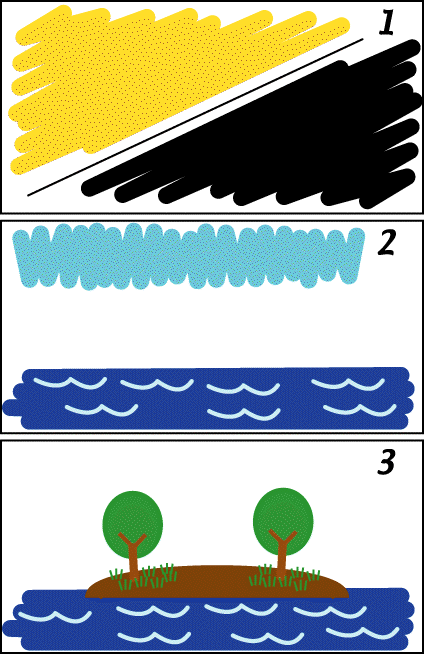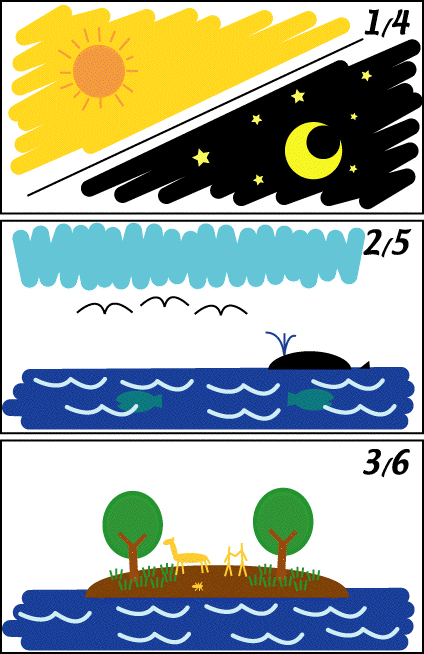1 In the beginning God created the heavens and the earth. 2 Now the earth was formless and empty, darkness was over the surface of the deep, and the Spirit of God was hovering over the waters. 3 And God said, "Let there be light," and there was light. 4 God saw that the light was good, and he separated the light from the darkness. 5 God called the light "day," and the darkness he called "night." And there was evening, and there was morning--the first day.
6 And God said, "Let there be an expanse between the waters to separate water from water." 7 So God made the expanse and separated the water under the expanse from the water above it. And it was so. 8 God called the expanse "sky." And there was evening, and there was morning--the second day.
9 And God said, "Let the water under the sky be gathered to one place, and let dry ground appear." And it was so. 10 God called the dry ground "land," and the gathered waters he called "seas." And God saw that it was good. 11 Then God said, "Let the land produce vegetation: seed-bearing plants and trees on the land that bear fruit with seed in it, according to their various kinds." And it was so. 12 The land produced vegetation: plants bearing seed according to their kinds and trees bearing fruit with seed in it according to their kinds. And God saw that it was good. 13 And there was evening, and there was morning--the third day.
14 And God said, "Let there be lights in the expanse of the sky to separate the day from the night, and let them serve as signs to mark seasons and days and years,15 and let them be lights in the expanse of the sky to give light on the earth." And it was so. 16 God made two great lights--the greater light to govern the day and the lesser light to govern the night. He also made the stars. 17 God set them in the expanse of the sky to give light on the earth,18 to govern the day and the night, and to separate light from darkness. And God saw that it was good. 19 And there was evening, and there was morning--the fourth day.
20 And God said, "Let the water teem with living creatures, and let birds fly above the earth across the expanse of the sky." 21 So God created the great creatures of the sea and every living and moving thing with which the water teems, according to their kinds, and every winged bird according to its kind. And God saw that it was good. 22 God blessed them and said, "Be fruitful and increase in number and fill the water in the seas, and let the birds increase on the earth." 23 And there was evening, and there was morning--the fifth day.
24 And God said, "Let the land produce living creatures according to their kinds: livestock, creatures that move along the ground, and wild animals, each according to its kind." And it was so. 25 God made the wild animals according to their kinds, the livestock according to their kinds, and all the creatures that move along the ground according to their kinds. And God saw that it was good. 26 Then God said, "Let us make man in our image, in our likeness, and let them rule over the fish of the sea and the birds of the air, over the livestock, over all the earth, and over all the creatures that move along the ground." 27 So God created man in his own image, in the image of God he created him; male and female he created them. 28 God blessed them and said to them, "Be fruitful and increase in number; fill the earth and subdue it. Rule over the fish of the sea and the birds of the air and over every living creature that moves on the ground." 29 Then God said, "I give you every seed-bearing plant on the face of the whole earth and every tree that has fruit with seed in it. They will be yours for food. 30 And to all the beasts of the earth and all the birds of the air and all the creatures that move on the ground--everything that has the breath of life in it--I give every green plant for food." And it was so. 31 God saw all that he had made, and it was very good. And there was evening, and there was morning--the sixth day.
1 Thus the heavens and the earth were completed in all their vast array. 2 By the seventh day God had finished the work he had been doing; so on the seventh day he rested from all his work. 3 And God blessed the seventh day and made it holy, because on it he rested from all the work of creating that he had done.
Genesis 1:1-2:3 (NIV)
Let's put aside for now some detailed questions such as these: "What is the 'waters' that Gods spirit was hovering on?" "Did plants exist before the sun?" "What are the 'great creatures'"? etc. Instead, think of what the author's main points are from this passage. I like to point out three things that seem to me the author is emphasising by repeating the ideas. The first is that when God spoke, it was so. The second is that God saw what he created as being good. (For some reason this was not stated on the second day. But on the sixth day, he saw what he created as being very good, including mankind.) And the third point is that the author repeats the phrase "And there was evening, and there was morning" as if he emphasises the regularity of the time flow.
Now the author tells us that God created the day and the night on the first day, separated the water and made the sky on the second day, and created the sea, the land and vegetation on the third day. This can be pictured as follows:

Then God created the sun, the moon, and the stars on the fourth day, the living creatures in the water and the birds in the sky on the fifth day, and the living creatures on the land including mankind on the sixth day. This can be pictured as follows:

Don't you notice something when you compare the above two pictures? Please stop here and look at them very carefully.
Yes. God created the "places" from the first day to the third day, and he created the corresponding "inhabitants" from the fourth day to the sixth day. Do you think this happened coincidentally? No. I think the author intended this structure.
I believe that the author aimed to tell his readers simply that "God created the world" by this symmetrical and poetical expression. If this is the case, then the passage is a figurative expression and it does not necessarily describe exactly what had happened in the past. When the author of a Psalm tells us "When I consider your heavens, the work of your fingers, the moon and the stars, which you have set in place" (Psalm 8:3), is he trying to tell us that Gods fingers appeared in the sky to set the moon and the stars in place? No! Isn't he simply telling us with this figurative expression that he regards the world as Gods creation?
I do not have any problem accepting that God created the world in six sets of 24 hours exactly as described in the Genesis. He is almighty anyway. But I do not think it is necessary to believe this. One can see the description in Genesis as figurative. God may well have created the world with a process similar to what the evolution theory explains, and I see no contradiction of it with the Genesis account. Since in this case, the author of Genesis may simply have chosen a figurative way to tell the readers that God created the world, and whether things really happened as he described it, only God knows.
If we could ask the author of Genesis "Did God create the world in six sets of 24 hours?" what do you think he would answer?
| Prev | Next | Go Up | Japanese Page |
Produced by Hajime Suzuki
Special thanks to John Lew and Karen Spenser for their suggestions for this translation
Special thanks to my wife Louise for her constant encouragement and patience